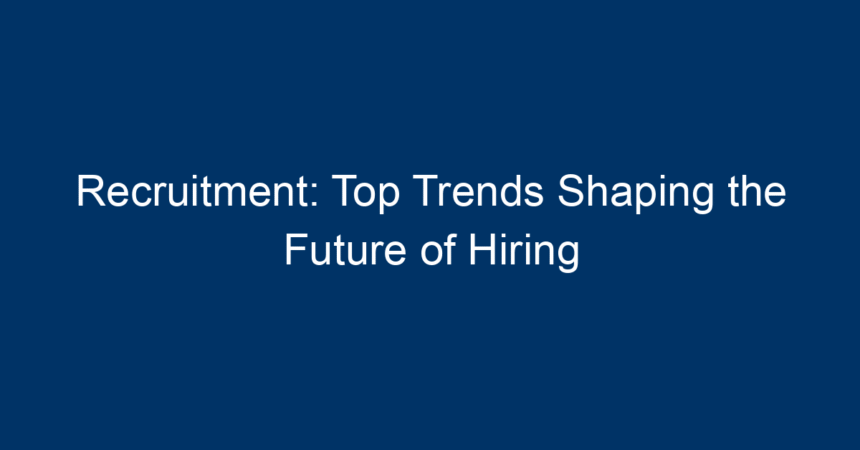In today’s rapidly evolving job market, recruitment is undergoing a significant transformation. Gone are the days when hiring processes were straightforward and predictable. As businesses adapt to new technologies, changing workforce demographics, and a competitive landscape, innovative recruitment strategies are emerging. Understanding these trends is essential for companies aiming to attract the best talent. In this article, we’ll delve deep into the trends shaping the future of hiring, providing actionable insights that can elevate your recruitment efforts.
The Rise of Remote Work
A New Era in Talent Acquisition
The COVID-19 pandemic has forever changed the way we work, prompting a widespread shift to remote work. Organizations are now seeking talent beyond geographical boundaries, allowing them to tap into a global pool of candidates. Remote work not only expands the talent market but also enables companies to embrace diverse perspectives and skills.
Embracing Hybrid Models
Many organizations are adopting a hybrid work model, where employees have the flexibility to work both in-office and remotely. This flexibility becomes a critical recruitment tool, attracting top candidates who value work-life balance. Companies need to clearly communicate their policies regarding remote work to appeal to prospective employees.
The Power of Employer Branding
Building a Positive Reputation
Employer branding is crucial in today’s recruitment landscape. Candidates are not only looking for competitive salaries; they are also considering company culture, values, and reputation. Organizations that invest in their employer brand attract higher-quality candidates.
Showcasing Company Culture
To strengthen your employer brand, utilize social media and company websites to showcase your culture. Highlight employee testimonials, team-building activities, and any community involvement. Authentic content resonates with potential candidates and fosters an emotional connection to the brand.
Data-Driven Recruitment
Leveraging Technology for Better Outcomes
Data-driven recruitment is transforming hiring processes. By utilizing analytics, organizations can gain insights into candidate behavior, improving decision-making. Recruitment software provides data on applicant tracking, conversion rates, and even candidate satisfaction, allowing HR teams to refine their strategies.
Enhancing Candidate Experience
Analyzing data related to candidate experience can help organizations identify pain points in the recruitment process. Regularly soliciting feedback allows for timely adjustments, ensuring that candidates remain engaged and satisfied throughout their journey.
Artificial Intelligence in Hiring
Streamlining Recruitment Processes
Artificial Intelligence (AI) is revolutionizing recruitment by automating repetitive tasks. From resume screening to interview scheduling, AI reduces the administrative burden on HR teams, freeing them to focus on strategic initiatives.
Enhancing Candidate Screening
AI-powered tools can analyze resumes and assess candidates based on predefined criteria. These tools can also mitigate unconscious biases, promoting diversity in hiring. However, it’s vital for organizations to ensure that AI algorithms are transparent and regularly updated.
Diversity and Inclusion Initiatives
Prioritizing Diverse Talent
Diversity and inclusion (D&I) are not just buzzwords; they are critical components of modern recruitment strategies. Organizations are increasingly recognizing the value of diverse teams, which foster innovation and improve business performance.
Implementing Inclusive Recruitment Practices
To enhance D&I, employers should review their job descriptions, use inclusive language, and implement structured interviews. Additionally, establishing partnerships with organizations that focus on underrepresented talent can strengthen outreach efforts.
Skills-Based Hiring
Shifting Focus from Credentials
The traditional reliance on degrees and qualifications is gradually giving way to skills-based hiring. Employers are recognizing that candidates can offer valuable skills regardless of their formal education. This trend opens doors for individuals from non-traditional backgrounds to enter the workforce.
Utilizing Assessments and Portfolios
To evaluate skills effectively, organizations can incorporate assessments, coding tests, or practical simulations into their hiring processes. Candidates can also showcase their abilities through portfolios, giving them a platform to demonstrate their expertise.
Real-Time Feedback and Communication
Keeping Candidates Engaged
Timely communication and feedback are essential for a positive candidate experience. Many candidates report dissatisfaction when they do not receive updates about their application status. Recruiters should establish a clear communication strategy, providing regular updates and feedback throughout the hiring process.
Utilizing Technology for Efficient Communication
Employing chatbots and CRM systems can streamline communication between recruiters and candidates. These tools can provide instant responses to frequently asked questions, improving engagement and ensuring candidates feel valued.
Social Recruiting
Leveraging Social Media Platforms
Social media has become a powerful recruitment tool. Platforms like LinkedIn, Facebook, and Twitter are ideal for reaching potential candidates. Recruiters can share job postings, engage with users, and even conduct informal interviews through social media.
Building Online Communities
Creating an online community around your organization can enhance brand visibility and attract talent. Encourage employees to share their experiences and engage with followers to amplify your recruitment efforts.
Conclusion: Actionable Insights for Future Recruitment
As the world of recruitment continues to evolve, organizations must stay ahead of the curve. Here are actionable insights to enhance your hiring processes:
-
Adopt Remote Work Flexibility: Embrace a hybrid work model and communicate your policies clearly to attract top talent.
-
Invest in Employer Branding: Showcase your company culture and values through authentic content on social media and your website.
-
Leverage Data and AI: Utilize analytics and AI tools to streamline processes and enhance decision-making while maintaining transparency.
-
Prioritize Diversity and Inclusion: Implement inclusive recruitment practices and collaborate with organizations focused on underrepresented talent.
-
Focus on Skills, Not Degrees: Create pathways for candidates from diverse backgrounds by assessing their skills through practical evaluations.
- Enhance Communication: Establish a clear communication strategy, utilizing technology to keep candidates engaged and informed.
By embracing these trends, organizations can refine their recruitment strategies, attract top talent, and build a diverse and innovative workforce. The future of hiring is bright, and those who adapt will reap the rewards in an ever-competitive job market.




